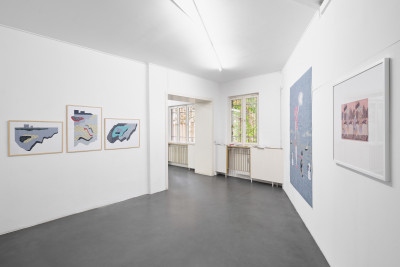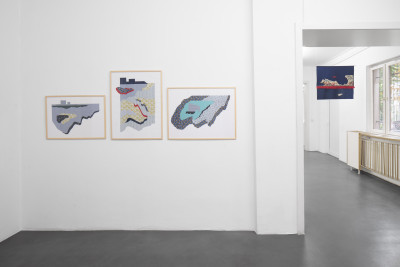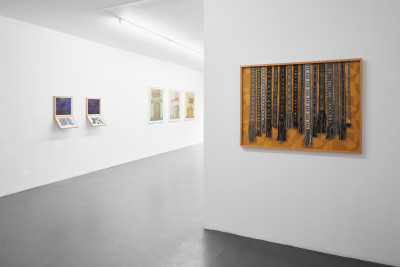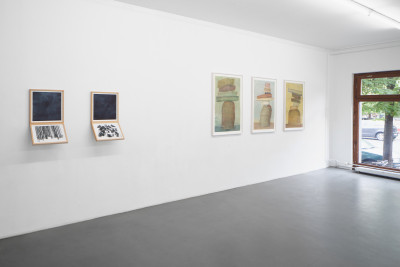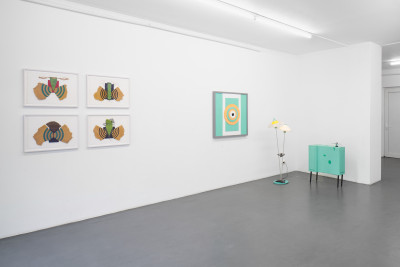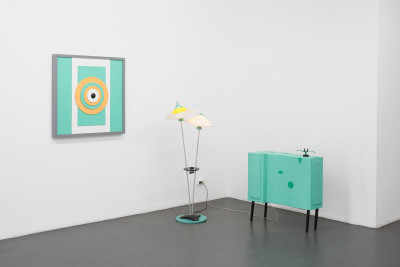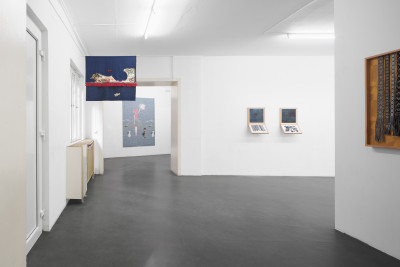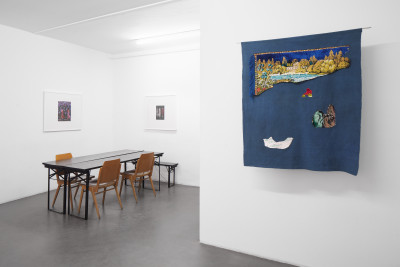"On Adornments", with Ivan Gallery at Spike Berlin, 2 October – 30 October 2020

With Geta Brătescu, Tobias Kaspar, Kaarel Kurismaa, Simona Runcan, Jaanus Samma, Iulia Toma
We are gallerists and friends Olga Temnikova from Temnikova & Kasela and Marian Ivan from Ivan Gallery. For years, we have been seeing each other at art fairs and events around the world, and following each other’s programmes. Communicating more during quarantine, we finally got a chance to prepare a collaboration. We decided to try a new exhibition format, and Berlin seemed like a good meeting point. For this occasion, we put together a display by artists we would like to introduce now, mainly from Estonia and Romania where our galleries are located.
Geta Brătescu (b. 1926, Ploiești - d. 2018, Bucharest, Romania) has been a central figure of Romanian contemporary art since the 1960s. An artist with a rich and long career, Brătescu developed a complex body of work that comprises drawing, collage, engraving, tapestry, object, photography, experimental film, video, and performance. She studied at the Faculty of Letters and Philosophy and concurrently at the Fine Arts Academy in Bucharest and worked as an artistic director for the magazine “Secolul 20 [20th Century]”, renamed “Secolul 21 [21st Century]” at the turn of the millennium.
Brătescu took part in some of the most important contemporary art exhibitions, such as Documenta 14, Athens and Kassel (2017), La Biennale di Venezia (2013), La Triennale, Paris, Palais de Tokyo (2012) and the 12th Istanbul Biennial (2011), to name just a few. In 2017, Geta Brătescu represented Romania in the Venice Biennale with the project “Apparitions”, the first solo show of a woman artist in the Romanian Pavilion.
Among her recent solo shows are the ones at Kunstmuseum St Gallen (2020) , Neuer Berliner Kunstverein, Berlin (2018), Hauser & Wirth Los Angeles (2018) and New York (2017), Camden Arts Center, London and MSK Gent (2018), Hamburger Kunsthalle, Hamburg (2016), Tate Liverpool (2015), Berkeley Art Museum and Pacific Film Archive (2014).
Tobias Kaspar was born in 1984 in Basel and lives in Riga and Zurich. Tobias Kaspar’s practice raises questions about how to behave in today’s mainstream society; how, when and under what circumstances, one can curve out a space of one’s own, and thus question this very ambition in itself. Kaspar work exemplifies a strategy that uses appearance in different economies to reflect and question the artist’s own position and the position we are in at large.
Kaspar work has been shown in institutions, including the Museum of Modern Art in Warsaw (2016), Wattis Institute for Contemporary Art, San Francisco (2015), Solo Shows, São Paulo (2015), CAFAM Biennale, Beijing (2014), Kunsthalle Wien (2014), Kunsthalle St. Gallen (2014), Midway Contemporary Art, Minneapolis (2013), Artists Space, New York (2013), Palais de Tokyo, Paris (2012), Kunsthalle Zürich (2011), Kunsthalle Basel (2011), Museum Hamburger Bahnhof, Berlin (2011), Kunsthaus Bregenz (2011), Künstlerhaus Stuttgart (2010).
Kaarel Kurismaa (b. 1939, Pärnu) is the first and most prominent sound art and sound installation artist in Estonia. A pioneer of kinetic art, his practice also expands to the fields of painting, animation, public space monumental art and stage installations.
From the late 1970s, Kurismaa worked on animated children’s films, painting, and public space commissions, realising close to ten kinetic and sound objects during the 1980s. He resumed his focus on sound in the 1990s, concentrating on creating site-specific installations interacting with space using visual and acoustic means.
Kurismaa’s first retrospective exhibition “Yellow Light Orchestra” took place at KUMU Art Museum, Tallinn, in 2018, followed by a solo show “The Old Man and the Musical Score” at Temnikova & Kasela, Tallinn (2019-2020).
Simona Runcan was born in 1942 in Bucharest, where she graduated in 1966 from the Graphic Arts Department of the Fine Arts Institute. Her works of graphic art, objects, paintings and installations explore in a processual, serial and cyclic manner various themes and working means, from the ‘60s-‘80s experimental, conceptualist graphics to the more tradition-oriented painterly approach embraced by her after 1990. Although she has exhibited in national and international solo and group shows, her practice remained overall little known or acknowledged, at home and abroad. The echoes of her neo-avantgarde approach couldn’t reverberate in the state-controlled Communist artistic system nor in the chaotic artistic scene of the early ‘90s and 2000s in Romania.
After she passed away somewhat prematurely in 2007, her works haven’t been exhibited until 2016, when her family together with a group of young art historians organised an extensive retrospective at the Mogoșoaia Cultural Centre near Bucharest, followed by a first solo show at Ivan Gallery in 2016, featuring her debut series of works, “The Presence of Objects”, drawings and etchings on paper from 1969-1972 and a second Ivan Gallery solo show in 2018 with paintings from the last part of career, “Silent Cohabitations”.
Jaanus Samma (b. 1982) is a visual artist based in Tallinn. He studied at the Estonian Academy of the Arts, Tallinn. His works include photographs, installations and videos centred around the study of urban space and our subjective experiences of it. Over the years, Samma’s interests and research have become focused on gender studies and representation of male sexuality. Investigating how these issues can be discussed and portrayed in art, he combines fieldwork – interviews and archival research – with subjective artistic practice based on his findings.
Samma is recently took part in the WIELS residency program, Brussels. In 2015, he represented Estonia at the 56th Venice Biennale with his project “NSFW. A Chairman’s Tale”. In 2013, he was awarded the Köler Prize by the Contemporary Art Museum of Estonia.
Samma’s recent solo exhibitions include „Outhouse by the Church”, curated by Eugenio Viola, Nomas Foundation, Rome (2018); "Sõnumid – Viestejä", The Aine Art Museum, Tornio (2018); "Dialogue. Mare Vint and Jaanus Samma", KUMU Art Museum, Tallinn (2017–2018); "Divider", Temnikova & Kasela, Tallinn (2017); “Three Works at a Canteen”, ex-canteen factory Kalibr, Minsk (2016); “Not Suitable For Work. A Chairman’s Tale”, curated by Eugenio Viola, Museum of Occupations, Tallinn (2016); “Unrest", Gotlands Konstmuseum (2015); "The Hair Sucks Sweater Shop", Tallinn Art Hall Gallery (2014); and "Chairman. The Opera", Kunstraum B, Kiel (2013).
His works have been featured in group exhibitions including “There and Back Again. Contemporary art from the Baltic Sea region”, Kiasma, Helsinki (2018-2019); “The State is not a Work of Art”, curated by Katerina Gregos, Tallinn Art Hall (2018); "Queerly Classed", curated by Yevgeniy Fiks and Olga Kopenkina, Franklin Street Works, Connecticut (2017); "Sculpture Quadrennial", Riga (2016); “Masters Peasants Peasants Masters”, BWA Sokól, Nowy Sacz (2016); “Kunstnerbøger – Vildt Voksende”, Den Frie Centre of Contemporary Art, Copenhagen (2016); XX Mänttä Art Festival (2015); “Is This the Museum That We Wanted?”, Tartu Art Museum (2014); “Afterlives of Gardens”, KUMU Art Museum, Tallinn (2013); “Corporal Punishment”, Contemporary Art Museum of Estonia, Tallinn (2012); “Untold Stories”, Tallinn Art Hall (2011); Luleå Art Biennial (2009); and “Exposition d´Art Contemporain Balte”, Cité Internationale des Arts, Paris (2008).
Iulia Toma (b. 1974, Romania, lives and works in Bucharest) is a mixed-media artist who works with the means of aesthetic expression through textile, as well as with photography, painting, installation and text in each of her works. Recently she has been focusing on social issues that she expresses in her own individual way: feminism, women's rights, interpersonal relations of closed communities, the materiality of urban living, social justice, etc.. Toma builds a personal discourse that is expressively and aesthetically organised in visual and activist orientations, each time trying to place the balance between message and material at an ever increasingly elaborate level. She teaches in the Department of Art & Design, Textile section at the National University of Arts Bucharest, her pedagogical and artistic activity being a harmonious mix. Among her recent exhibitions are: in 2019 "Displacement and Togetherness" (group show, Cultuurcentrum Strombeek Grimbergen, Belgium, part of the Europalia Arts Festival Romania), Art Encounters Biennial 3rd edition (group show, Timișoara, Romania), "After the Canal, there was only 'our' world" (group show, City Gallery – Mestna galerija, Ljubljana), 2018 "At Different Angles" (group show, MNAC – The National Museum of Contemporary Art, Bucharest), 2017 "In situ, B5 Studio" (group show, ArtEncounters Timișoara, Romania), 2016 "Dura-Europos" (solo show, Ivan Gallery, Bucharest), 2015 "Mapping Bucharest: Art, Memory, and Revolution 1916-2016" (group show, part of Vienna Biennale 2015, MAK Vienna), "Twilled Connections" (group show at tranzit.ro, Bucharest).
